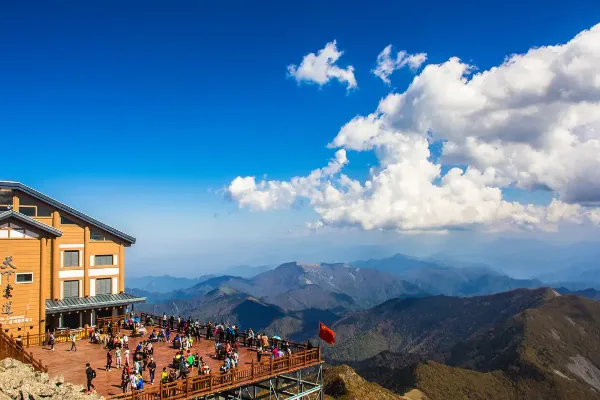
Taibai Mountain National Park is located across Mei County, Taibai County, and Zhouzhi County in Baoji City, Shaanxi Province. As the highest peak of the Qinling Mountain Range, it's also the tallest mountain in inland China east of the Qinghai-Tibet Plateau. Designated as a National 5A-level Scenic Area, it covers approximately 565 square kilometers (with a core area of 106.36 sq km). The park uniquely combines altitude, cold climate, ruggedness, wonder, beauty, and serenity, featuring Quaternary glacial relics, alpine lakes, and vertical natural zones, along with profound historical culture. Above 3,000 meters elevation, there are six glacial lakes including Daye Hai (Big Grandpa Lake) and Erye Hai (Second Grandpa Lake). Facilities include the Sky Cableway (2,936m long with 1,209m elevation change), Fuyunge Cableway, visitor centers, and Bansi New Village accommodations.
History and Culture
Taibai Mountain's history traces back to antiquity, mentioned as "Dunwu Mountain" in Shangshu·Yugong and "Taiyi Mountain" in Han Dynasty records before being permanently named "Taibai Mountain" (meaning 'Great White Mountain') during the Wei-Jin period for its perpetual snowcap. The area preserves numerous cultural relics like Baxiantai (Immortal Summit), traditionally regarded as where Jiang Ziya appointed gods during the Zhou Dynasty. The Tang Dynasty built Taibai Temple here, and Su Shi famously prayed for rain at the mountain when serving as Fengxiang magistrate. As a cradle of Taoist culture, the mountain hosts structures like Laojun Temple and Sanguan Hall, exemplifying harmony between nature and humanity.
Main Attractions
Heaven's Round Earth's Square
At 3,511m elevation, this marks China's north-south geographical divide where visitors can "straddle two regions with one step" - witnessing the watershed between Yangtze and Yellow River systems. The observation deck offers panoramic views of Baxiantai and alpine meadows, making it Taibai's iconic photo spot.
Baxiantai (Immortal Summit)
The 3,771.2m main peak - eastern China's highest point - contains ruins of the legendary "God-Appointing Platform." Summit views encompass Qinling ranges, glacial lakes, and in summer, boulder fields from ancient glaciers. Its winter snowscape inspired the saying "Taibai's snow lingers through June."
Daye Hai (Big Grandpa Lake)
Taibai's highest glacial cirque lake (3,650m) spans 5,000 sqm with crystal-clear waters that never dry. Home to rare birds and surrounded by the reputed herbal-gathering site of physician Sun Simiao, it's called the "Pearl of Qinling."
Sky Cableway
Asia's highest-elevation-gap cableway (2,936m) connects Honghuaping to Heaven's Round Earth's Square in 25 minutes. Passengers observe Qinling's vertical vegetation zones, experiencing "four seasons in one day" - spring blossoms, summer greenery, autumn foliage, and winter snowscapes.
Cuisine
Qishan Saozi Noodles
Baoji's signature wheat noodles served in small bowls with minced pork, tofu, black fungus, and a sour-spicy broth. The traditional "one-bite fragrance" style encourages multiple servings.
Mei County Hand-Pulled Noodle Skin
Chewy steamed wheat sheets tossed with chili oil, Qishan vinegar, and garlic paste - served as appetizers or with roujiamo (pork burgers).
Douhua Paomo (Tofu Pudding with Bread)
Silken tofu in bone broth with baked bread chunks, garnished with chili oil and cilantro - a hearty local breakfast.
Regional Specialties
Nearby offerings include Taibai Medicinal Cuisine (with codonopsis and astragalus), potato sticky cakes, buckwheat vinegar noodles, as well as kiwi fruit snacks and Taibai liquor.
Tickets
Peak season (Mar 1-Nov 30): ¥100/person; Off-season: ¥50. Shuttle buses (visitor center-Honghuaping) cost ¥90 round-trip. Cableways: Sky Cableway ¥230 round-trip; Fuyunge Cableway ¥90. Seniors, disabled visitors, and active military personnel receive discounts with ID.
Opening Hours
Peak season: Ticket office 8:00-16:00; shuttles 8:00-19:00; Sky Cableway 8:30-17:30; Fuyunge 8:30-17:00. Off-season: Ticket office 8:30-15:00; all transport until 16:30-17:00.
Itineraries
One-Day Tour: Visitor center → Shuttle to Honghuaping (1hr) → Sky Cableway to Heaven's Round Earth's Square (2hr visit) → Hike to Baixiantai/Upper Bansi Temple (1.5hr) → Fuyunge Cableway down (Total 6-7hrs). Family-friendly.
Two-Day Summit Trek: Day 1 to Xiaowengong Temple (4hr hike); Day 2 to Dawengong Temple → Daye Hai → Baxiantai summit (5hr). Requires camping gear and experience. Alternate routes need professional guides.
Transportation
- Driving:
- From Xi'an: Ring Expressway → G30 → Lanzhou Village exit → Meitai Road (100km, 1.5hrs).
- From Baoji: G30 → Changxing exit or via Mei County bridge (60km, 1hr).
- High-Speed Rail:
- To Yangling South Station → Direct shuttle (¥20, every 30min 8:00-16:00).
- To Qishan Station → Bus 203 via Mei County (1.5hrs total).
- Buses:
- Direct from Xi'an Textile City/West stations (¥35-40, 2hrs).
- Local buses from Baoji West Station/Mei County (¥5-10).
Must-Sees
- Heaven's Round Earth's Square: Geographic landmark at 3,511m.
- Baxiantai: Summit climb with glacial views (strenuous).
- Daye Hai: Pristine alpine lake photography spot.
- Sky Cableway: Aerial views with minimal effort.
Travel Tips
- Check weather: Summer rains need raincoats; winter requires down jackets (-10°C~-15°C vs base).
- Arrive before 8am to avoid crowds. Hikers bring energy snacks and 2L water.
- Those with hypertension/heart conditions should avoid high altitudes.
- Overnight at Bansi or Daye Hai for sunrise views (~5:30-6:00am in summer).
Important Notes
- No smoking/open flames (¥2,000 fine).
- Unofficial routes like Aotai Trail are dangerous - multiple rescues occurred.
- Altitude oxygen is ~70% of sea level - descend if experiencing dizziness.
- Children require supervision; seniors bring ID for discounts.
- Post-hike hot springs in Tangyu Town (¥150-200) relieve soreness.